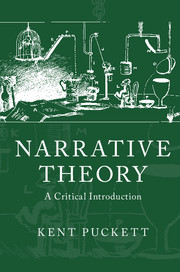Book contents
- Frontmatter
- Contents
- Acknowledgments
- Chapter 1 Introduction: Story/Discourse
- Chapter 2 Action, Event, Conflict: The Uses of Narrative in Aristotle and Hegel
- Chapter 3 Lost Illusions: Narrative in Marx, Nietzsche, and Freud
- Chapter 4 Epic, Novel, Narrative Theory: Henry James, Georg Lukács, Mikhail Bakhtin, and Erich Auerbach
- Chapter 5 Form, Structure, Narrative: Propp, Shklovsky, Saussure, Lévi-Strauss
- Chapter 6 Narratology and Narrative Theory: Kristeva, Barthes, and Genette
- Bibliography
- Notes
- Suggested Further Reading
- Index
Chapter 2 - Action, Event, Conflict: The Uses of Narrative in Aristotle and Hegel
Published online by Cambridge University Press: 01 December 2016
- Frontmatter
- Contents
- Acknowledgments
- Chapter 1 Introduction: Story/Discourse
- Chapter 2 Action, Event, Conflict: The Uses of Narrative in Aristotle and Hegel
- Chapter 3 Lost Illusions: Narrative in Marx, Nietzsche, and Freud
- Chapter 4 Epic, Novel, Narrative Theory: Henry James, Georg Lukács, Mikhail Bakhtin, and Erich Auerbach
- Chapter 5 Form, Structure, Narrative: Propp, Shklovsky, Saussure, Lévi-Strauss
- Chapter 6 Narratology and Narrative Theory: Kristeva, Barthes, and Genette
- Bibliography
- Notes
- Suggested Further Reading
- Index
Summary
Beginning, Middle, and End: Aristotle and Narrative Theory
I like to take in hand none but clean, virgin, fair-and-square mathematical jobs, something that regularly begins at the beginning, and is at the middle when midway, and comes to an end at the conclusion; not a cobbler's job, that's at an end in the middle, and at the beginning at the end.
Herman Melville, Moby-Dick; or, The WhaleTo begin at the beginning: something very like the story–discourse relation appears in Aristotle's Poetics, one of the first and still most influential works of systematic literary theory. Reading the Poetics can be a strange because all-too-familiar experience: although the text is from so distant and different a time and although it focuses on the particular genre of Athenian tragedy, its concerns and questions about the nature of literary representation and narrative form nonetheless feel very familiar, a fact that would seem indeed to suggest the near-universality of some aspects of narrative. Although Aristotle's Poetics covers a wide range of issues – the nature of dramatic spectacle, the emotional effects of a good tragedy on an audience, the theatrical use of song, and the role of the chorus – it is most centrally concerned with the nature and structure of tragic plots: “the first essential, the life and soul, so to speak, of tragedy is the plot.” Aristotle understands plots as what Cynthia Freeland refers to as “artifacts constructed by tragic poets within constraints of a kind of realism of intended representation of actions,” as, in other words, the aesthetic arrangement of actions that took place in a real or an imagined time into an ordered and organic form – beginning, middle, and end – that either reveals or in fact produces those actions as meaningful. Tragedy is, in other words, a generically specific configuration of the two narrative levels that we have been calling story and discourse, and the Poetics is thus an early – maybe the earliest – example of what I am calling narrative theory.
What makes one plot better than another? What are its necessary components? What makes the whole structure of a tragedy meaningful?
- Type
- Chapter
- Information
- Narrative TheoryA Critical Introduction, pp. 24 - 75Publisher: Cambridge University PressPrint publication year: 2016

